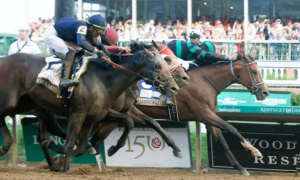In a makeshift room inside St Andrew’s Cathedral in Singapore’s Central Business District, small groups of people gather every Thursday evening to share their stories and seek help for gambling addiction. It is a group made up of people from numerous backgrounds: some show up wearing polished, corporate attire while others sit in shorts and flip-flops looking dishevelled. Topics range from overcoming temptation to dealing with debt collectors. One attendee admits to having borrowed around S$200,000 (US$157,680) from over 20 different money lenders, both legal and illegal. The rest of the largely male group later cite him as they share their stories for the week, candidly crediting him for making them feel better about their debts. A number are family members of the gamblers, turning up faithfully to show their support as well as the desire to understand their struggles.
Ronnie Soh, one of the facilitators, moderates the discussion, shifting the focus from one attendee to the next. Along with fellow recovery volunteer Raymond Lim, he encourages them to not lose sight of their goals. Soh, 31, found himself gambling at the age of 21. “You can learn many vices when you’re in the army,” he says, recalling the commonplace drinking, drugs and womanizing habits among military men. We meet at a McDonald’s in the east of Singapore. It is a Saturday morning, and the fast food restaurant is crowded with families. Ronnie sits quietly in a maroon button-up, fiddling with his phone. Amid the chatter, he recalls the generational influence that his father, a “hardcore gambler,” had on him. While he grew up resenting his father for his gambling habits, his own life took an ironic turn when he discovered the thrill of betting on soccer matches. “It was fast money,” he says. “With soccer betting, I would know if I won money within 90 minutes… every night I’d just be in front of the computer placing bets.”
His debts grew over the years, eventually snowballing to a six-figure sum. Then a staff sergeant who had been with the Singapore Armed Forces for 10 years, Ronnie was dismissed when illegal money lenders began making harassing phone calls to the office. “We were doing sensitive work, so it became a nuisance and it wasn’t something they could contain,” he reflects. His parents bailed him out, selling the house to repay his debts. Now a sales manager, Ronnie is part of the seekers’ group, a community of recovering gambling addicts who are actively shifting their priorities toward a life without gambling. Still, he admits that the temptation is still there and will probably always remain. For many gamblers, the adrenaline rush of winning a large sum of money is all it takes. A recently published study by the University of Exeter and Swansea University in the United Kingdom has shown that gamblers respond almost as positively to a near win as when they actually hit the jackpot. With rising costs of living, as well as the availability of mobile internet gambling, it is unsurprising that gambling addiction is a rising trend in Singapore society.
For much of the public, the debate surrounding gambling started when Singapore allowed the building of two casinos in a wider bid to draw in tourism dollars. Resorts World Sentosa and Marina Bay Sands opened in 2010, and together generated revenues of S$6 billion in 2013, just short of the S$6.5 billion generated in Las Vegas. Singapore is placed third in terms of global gaming revenue, behind Las Vegas and Macau.









